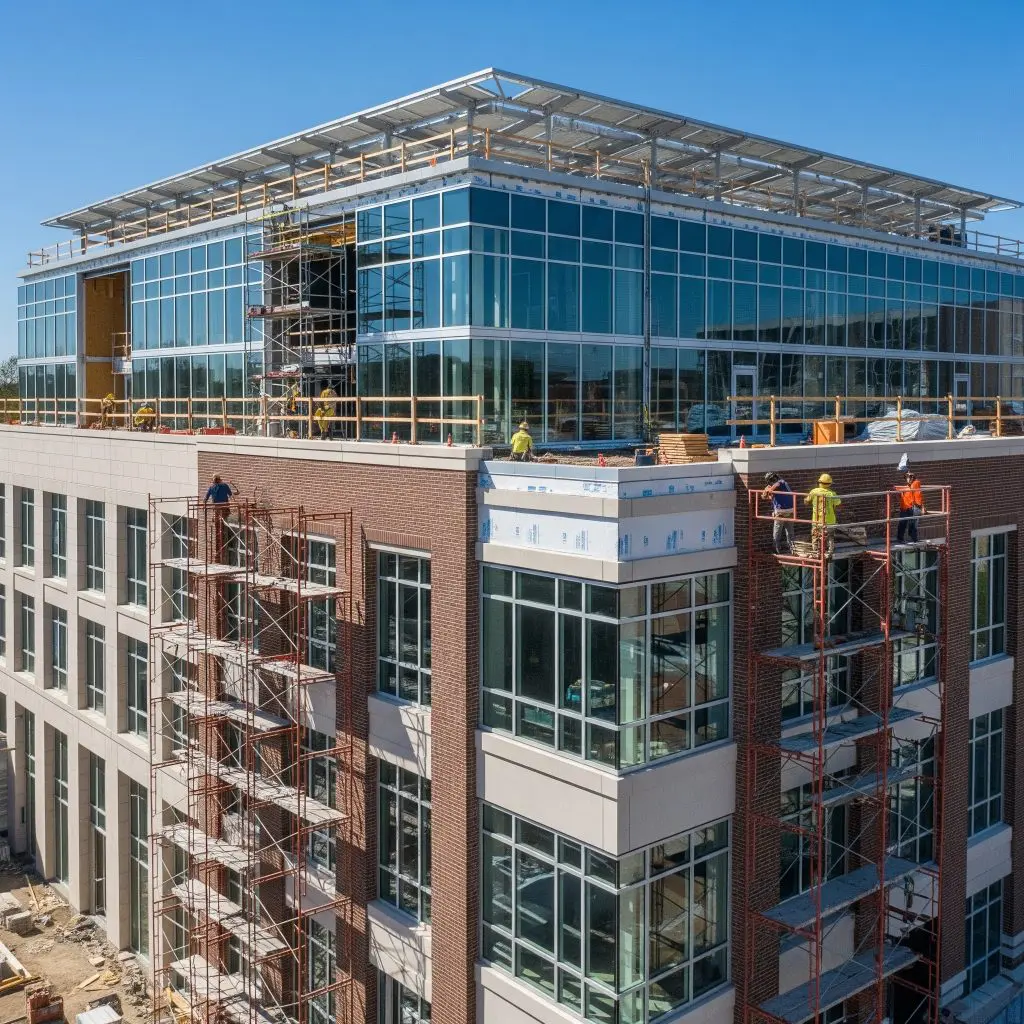Denver – October 29, 2025: Getting the right funding can be the difference between a good idea and a thriving business. For countless small business owners, the solution lies with a government-backed loan from the U.S. Small Business Administration (SBA). These loans—particularly the versatile SBA 7(a) program—offer long repayment terms, low down payments, and competitive rates that traditional bank loans simply can’t match.
But the process can seem complex. If you’re ready to secure capital for your Colorado business, understanding the step by step process to apply for an SBA loan is the first, most critical step.
This authoritative guide will break down the application journey into clear, actionable phases, provide current market data, and show you why partnering with a specialist like GHC Funding is your best strategy for success.
- Phase 1: Preparation and Qualification—The Groundwork
- Phase 2: Choosing Your Partner & Submitting the Application
- Phase 3: Approval and Closing
- Current Market Insights and Benefits (as of October 29, 2025)
- Advanced Geo-Targeting: Colorado's Economic Landscape
- Relevant Q&A: Your SBA Loan Questions Answered
- External Resources for Colorado Small Business Owners 🏔️
- Your Next Step: Don’t Go It Alone
- Get an SBA loan in Colorado.
Phase 1: Preparation and Qualification—The Groundwork
Before you even speak to a lender, you need to understand the fundamental requirements and prepare your documentation. This is where most applicants falter, but proper groundwork ensures a smooth application.

1. Confirm Eligibility & Purpose
First, make sure your business is eligible. The business must be:
- For-Profit and operate legally within the U.S.
- Small under SBA size standards (based on revenue or employee count, which vary by industry).
- Unable to obtain credit elsewhere on reasonable terms (a core SBA requirement).
- Creditworthy with a demonstrable ability to repay the loan from business cash flow.
Next, define the purpose of the loan. SBA 7(a) funds are incredibly flexible and can be used for working capital, equipment, inventory, real estate, or refinancing high-cost business debt.
2. Gather Essential Documentation
SBA loans are rigorous because of their favorable terms. You must prove your business is financially sound. Key documents often include:
- Business Financial Statements: Profit & Loss (P&L) and Balance Sheets for the last 3 years, plus an interim statement.
- Personal and Business Tax Returns: Last 3 years for both the business and principal owners (20% or more ownership).
- Personal Financial Statement (SBA Form 413): A comprehensive snapshot of your personal assets and liabilities.
- Business Plan and Projections: A detailed plan, especially if the business is new or expanding, including one-year cash flow projections.
- Legal Documents: Articles of Incorporation, business licenses, leases, and contracts.
Are You an SBA Real Estate Loan Expert?

Test your in-depth knowledge on using SBA Loans for owner-occupied commercial Real Estate acquisition. These questions delve into the critical details that can impact your business's growth and financial strategy.
Phase 2: Choosing Your Partner & Submitting the Application
The SBA itself does not lend money directly for 7(a) loans; they provide a guarantee to a bank or non-bank lender. Choosing the right lender is arguably the most important step in the entire process.
3. Select an SBA-Approved Lender
Look for a lender with Preferred Lender Program (PLP) status, as they can approve loans faster without waiting for the SBA’s final review.
Why Choose GHC Funding?
For Colorado business owners, partnering with a specialist like GHC Funding provides a significant advantage over large, bureaucratic banks. We don’t just process paperwork; we provide deep expertise in SBA 7a loans, SBA 504 Loans, Bridge Loans, and Working Capital Solutions. We understand the nuances of the SBA process, providing personalized guidance and a streamlined application process that large banks often lack.
We act as your expert guide, helping you assemble a complete and compelling application package that maximizes your chance of approval. Visit www.ghcfunding.com to start your funding journey with a specialist you can trust.
4. Submit and Undergo Review
Once your documentation is compiled, the lender will submit the application. This phase includes:
- Lender Underwriting: The lender reviews your financials, credit history (business and personal), and collateral. They will conduct their own due diligence to ensure you meet both their internal standards and SBA requirements.
- SBA Submission (if applicable): If the lender does not have full delegated authority (PLP status), they submit the loan package to the SBA for their guarantee review.
- Additional Requests: Be prepared for the lender to ask for clarification or additional documents. Prompt responses are crucial to keeping the process moving.
Navigating SBA 7(a) Loans: An Essential Quiz for Small Business Owners

Test your knowledge on the SBA's most popular loan program, designed to fuel business growth and expansion - SBA 7(a) Loans!
Phase 3: Approval and Closing
5. Receive Approval and Close the Loan
Upon approval from the lender (and the SBA, if necessary), you will receive a commitment letter outlining the final terms, conditions, and fees. Once you accept and satisfy any outstanding conditions, the loan moves to the closing phase, where the final legal documents are signed and funds are disbursed according to the agreed-upon schedule.
Current Market Insights and Benefits (as of October 29, 2025)
The SBA loan program’s strength lies in its competitive rates and favorable terms, especially when contrasted with restrictive lines of credit or high-interest short-term loans.
Realistic Rates
SBA 7(a) loan rates are capped and tied to a base rate (usually the Prime Rate), plus a spread. As of October 29, 2025, with the Prime Rate at approximately 7.25%, the maximum variable rates for SBA 7(a) loans are generally:
| SBA 7(a) Loan Amount | Maximum Variable Interest Rate (Prime + Spread) | Approx. Rate Range |
| Up to $50,000 | Prime + 6.5% | $\approx 13.75\%$ |
| $50,001 to $250,000 | Prime + 6.0% | $\approx 13.25\%$ |
| Over $350,000 | Prime + 3.0% | $\approx 10.25\%$ |
Factors that Influence Your Final Rate:
- Loan Size and Term: Smaller, shorter-term loans generally have a higher maximum allowed rate.
- Personal and Business Credit: A strong personal credit score (680+) and consistent business revenue demonstrate lower risk, potentially securing a lower rate.
- Collateral: While the SBA may not always require full collateral, having sufficient assets can make your application more attractive to a lender.
Mastering the SBA 504 Loan: Your Essential Guide Quiz

Test your knowledge on the SBA's most popular loan program, designed to fuel business growth and expansion.
Key Benefits of an SBA Loan
- Long Repayment Terms: Up to 10 years for working capital and equipment, and up to 25 years for real estate, significantly lowering monthly payments.
- Lower Down Payment Requirements: Often as low as 10-20% for real estate or business acquisition, compared to 30-40% for conventional loans.
- No Prepayment Penalties: For most loans with a maturity of 15 years or less, you can pay it off early without penalty, which is a major advantage over many commercial loans.
Advanced Geo-Targeting: Colorado’s Economic Landscape
The diverse economy of Colorado—from the high-tech hub of Denver to the manufacturing centers of the Front Range—is ripe for SBA-backed financing. GHC Funding understands the unique capital needs across the Centennial State:
- Denver (80202, 80203): The downtown and Lodo districts are driven by tech, finance, and tourism. A growing service-based consulting firm in Denver, for example, might require a $350,000 SBA 7(a) working capital loan to hire specialized staff and expand office space, capitalizing on the city’s strong employment market.
- Colorado Springs (80903, 80907): Known for its defense and aerospace industry, this area has a constant need for specialized vendors. A precision parts manufacturer could use an SBA 504 Loan (a sister program to the 7(a) specializing in fixed assets) to purchase a $1.2 million CNC machine and expand their facility in the Northern Colorado Springs industrial parks.
- Fort Collins (80524): Fueled by higher education and craft brewing, new restaurants and retail operations thrive here. A popular gastropub in Old Town Fort Collins could use a $150,000 SBA Express loan to finance a major kitchen equipment upgrade, overcoming cash flow challenges during the off-season.
- Aurora (80011): With strong growth in healthcare and logistics near the Denver International Airport (DIA) corridor, a new medical office practice could use a $500,000 SBA 7(a) loan to cover tenant improvements and medical equipment purchases.
GHC Funding’s expertise is tailored to serve these specific needs, helping Colorado businesses secure the right financing for their expansion or stabilization goals.
Relevant Q&A: Your SBA Loan Questions Answered
Q1: How long does the SBA loan process take from application to funding?
A: The entire process typically takes 30 to 90 days. Preparation (Phase 1) is key. Choosing a Preferred Lender (PLP) like GHC Funding can significantly reduce the internal lender review time compared to non-PLP banks.
Q2: What is the maximum SBA loan amount I can apply for?
A: The maximum loan amount for the SBA 7(a) Loan Program is $5 million. The maximum for the SBA 504 program is determined by the project size, but the CDC portion is capped at $5 million (or $5.5 million for certain manufacturing and energy projects).
Q3: Do I need perfect credit to get an SBA loan?
A: No, but you need good credit. Most lenders prefer a personal credit score of 680 or higher. The SBA looks at the overall financial health and repayment ability of the business, but strong personal credit is non-negotiable, especially for smaller and newer businesses.
Q4: Will I have to personally guarantee the loan?
A: Yes. For most SBA loans, all owners with a 20% or more stake in the business are required to provide an unconditional personal guarantee. This is a standard SBA requirement to minimize risk.
Q5: Can I use an SBA loan to pay off existing, expensive debt?
A: Yes, the SBA 7(a) program allows for the refinancing of existing business debt, provided the new loan improves the business’s cash flow, which is a powerful way to recapitalize your business.
Q6: What if a traditional bank has already rejected my loan application?
A: The SBA program is designed precisely for businesses that cannot obtain funding on reasonable terms through conventional channels. A rejection doesn’t disqualify you, but you must still meet the SBA and the lender’s credit standards.
Q7: Do I need to be in business for a certain amount of time?
A: While most successful applicants have at least two years in business, the SBA does back loans for startups. For new ventures, the quality of your business plan, owner experience, and equity contribution become even more critical.
External Resources for Colorado Small Business Owners 🏔️
For local guidance and further support, leverage these high-quality, non-lender resources in Colorado:
- SBA Colorado District Office: https://www.sba.gov/district/colorado – Direct link to federal SBA programs and local news.
- Colorado Small Business Development Center (SBDC) Network: https://www.coloradosbdc.org/ – Provides free or low-cost confidential consulting and training.
- SCORE Denver Chapter: https://denver.score.org/ – Offers free business mentorship from experienced professionals.
- Denver Metro Chamber of Commerce: https://www.denverchamber.org/ – An excellent resource for networking, advocacy, and local business insights.
Your Next Step: Don’t Go It Alone
Navigating the step by step process to apply for an SBA loan can feel like scaling a mountain. The rewards—long terms, low payments, and growth capital—are worth the effort, but a misstep can cost you time and a potential approval.
Don’t let frustration with traditional bank rejections or the complexity of the forms hold you back from your expansion goals.
GHC Funding is ready to be your expert guide, simplifying the process and securing the best possible SBA 7a loan, SBA 504 Loan, or Working Capital Solution for your Colorado business.
Take action today. Contact GHC Funding for a no-obligation consultation about your business funding needs. Call us at 833-572-4327 or start your pre-application process now at www.ghcfunding.com.

